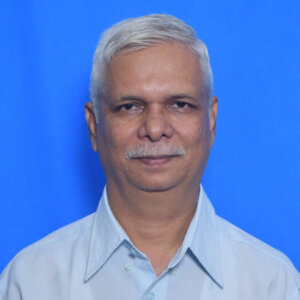Department of Geography
Establishment / mile stones:
B A (Mumbai Univ.) – 1969
M A (Tilak Maharashtra Univ.)– 2004 – 14
Dip. In GIS (Autonomous) – 2017 0nwards
1 Cartolab
1 Soil lab Platform
Teaching

Dr. Thakurdesai Surendra Chandrakant
Professor

Mr. Gavade Vinayak Shantaram
Assistant Professor
Visiting Faculty
UG
| Class | Semester | Course Nomenclature | Type(Optional, Elective, Compulsory, etc) |
| FYBCom | I & II | Environmental Studies | Compulsory |
| FYBA | I | Physical Geography | Optional |
| II | Human Geography | Optional | |
| SYBS | III | Climatology | Optional |
| III | Physical Geography of India | Optional | |
| IV | Oceanography | Optional | |
| IV | Agricultural Geography of India | Optional | |
| TYBA | V | Settlement Geography | Optional |
| V | Geography of Maharashtra | Elective | |
| V | Cartography I | Optional | |
| VI | Environmental Geography | Optional | |
| VI | Political Geography | Elective | |
| VI | Cartography II | Optional | |
| Diploma in GIS, GPS and Surveying (8 months, 3 modules) | |||
Programme & Course Outcomes
Programme Specific Outcomes
On Completion of the BA (Geography) Students shall be able to:
Study the land forms and processes.
Understand the structure, composition of different spheres of the Earth and its Atmosphere.
Understand importance of oceans, rivers and water and find ways of their conservation
Acquire skills in Map reading and interpretation
Understand how to study a region
Make use M S Excel in representation of statistical data
Course Outcomes
| Class | Course | Sem | Outcomes |
|---|---|---|---|
| FYBCom | Environmental Studies | I, II | 1.Know the basic components of environment 2. Understand man-environment interaction 3.Aware about importance of sustainable development 4.Imbibe green practices in day to day life |
| FYBA | Physical | I | 1.Develop interest in landforms around 2.Have basic knowledge of processes shaping the Earth’s crust 3.Acquire skill to understand basic contour patterns 4.Know the landforms seen in areas near by |
| Human | II | 1.Develop interest in human imprints on Earth 2. Understand the concept of resource 3. Correlate human activities with geographical setting 4. Develop skill of drawing graphs |
|
| SYBA | Climatology | III | 1.Understand the nature of atmosphere 2. Better knowledge of distribution of climatic factors on Earth 3. Learn processes behind climatic phenomenon occurring around 4. Learn to read Weather maps |
| Physical Geo of India | III | 1.Understand the physiographic setting of India 2. Know the water resource potential of India 3. Learn about mineral resource richness of India 4. Acquire map filling skill 5. Learn to draw map scales |
|
| Oceanography | IV | 1.Understand the distribution of seas
2. Learn physical and chemical properties of sea water 3. Know the nature of sea movements 4. Acquire skills of reading Bathymetric and Hydrographic charts |
|
| Agri. Geo of India | IV | 1.Understand the agricultural setting of India 2. Know the soil resource potential of India 3. Learn about industrial regions of India 4. Acquire map filling skill 5. Learn to convert map scales |
|
| TYBA | Settlement Geography | V | 1.Understand variety of settlements in rural and urban settings 2. Learn changing patterns in urban settlements 3. Know the functions settlements perform 4. Know the urbanisation in India |
| Geo of Maharashtra | V | 1.Understand the setting of Maharashtra 2. Knowledge of the resource base of Maharashtra 3. Learn distribution of primary activities in Maharashtra 4. Learn the pattern of industrial growth and distribution in Maharashtra |
|
| Cartography I | V | 1.Understand logic behind map making 2. Develop skill in map reading 3. Learn to use softwares to represent geographical data |
|
| Environmental Geo | VI | 1.Know the components of environment and Geographical component in it
2. Understand man-environment interaction 3.Aware about importance of sustainable development 4.Imbibe green practices in day to day life |
|
| Political Geography | VI | 1.Understand basic concepts in political geography
2. Know the relevance of frontiers and boundaries with respect to India 3. Learn major theories in political geography 4. Introduce to the electoral patterns and their relevance to Geography |
|
| Cartography II | VI | 1.Learn to analyse geographical data using simple statistical techniques and interpret the results
2. Learn sampling techniques 3. Develop field observation skill through field visit 4. Acquire report writing technique |
Workshops and Seminars
| Sr.No. | Subject |
|---|---|
| 1 | Geotsav- Geography fair open for all is organized in January since 2016 |
| 2 | Resource person in teacher’s training workshops all over India |
| 3 | Member, District Coastal Zone Management Committee |
| 4 | Member, District Environmental Impact Assessment Committee |
| 5 | E-learning material prepared for Balbharati Text books (State Board) |
Dr. Surendra C Thakurdesai
Area of research- Geomorphology, Coastal Studies, Environmental Geography
Research Guide- Geography and Environmental Science
M Phil –3 Awarded
Ph D-1 Awarded
3 Ongoing
Papers Published-9
Minor (UGC & MU)-4 ( Grant 2,19,000/-)
UGC Major-1 (Grant 11,79,000/-)
Coconut Board of India- 3 (Grant 3,39,000/-)
Industry Sponsored-1 (1,00,000/-)
Fellowship-IVLP of U S Department of Culture in ‘Climate Change and Clean Energy’ (2011)
| Sr | Name |
|---|---|
| 1 | Mr Suyog Patwardhan |
| 2 | Mr Mayuresh Potphode |
| 3 | Ms Sheetal Gawade |
| 4 | Ms Sonal Hardikar |
| 5 | Mr VInayak Gawde |



